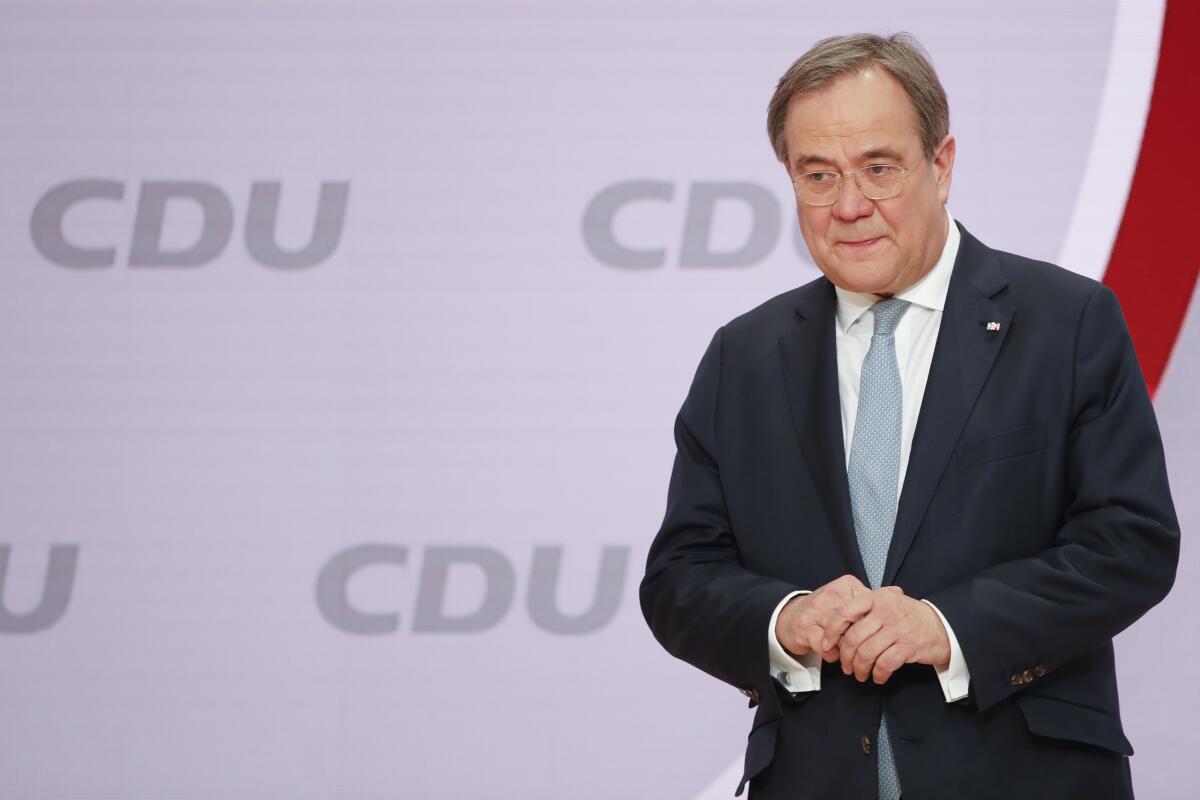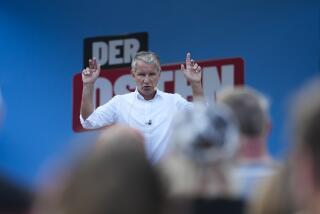In Germany, Angela Merkel’s party elects the pragmatic Armin Laschet as leader

- Share via
BERLIN — Chancellor Angela Merkel’s center-right party on Saturday chose Armin Laschet, the pragmatic governor of Germany’s most populous state, as its new leader — sending a signal of continuity months before an election in which voters will decide who becomes the new chancellor.
Laschet will have to build unity in the Christian Democratic Union, Germany’s strongest party, after beating more conservative rival Friedrich Merz. And he will need to plunge straight into an electoral marathon that culminates with the Sept. 26 national vote.
Saturday’s vote isn’t the final word on who will run as the center-right CDU’s candidate for chancellor in September, but Laschet will either run himself or have a big say in who does. He didn’t address his plans at Saturday’s convention.
Laschet, 59, was elected in 2017 as governor of North Rhine-Westphalia state, a traditionally center-left stronghold.
He governs the region in a coalition with the pro-business Free Democrats, the CDU’s traditional ally, but would likely be able to work smoothly with a more liberal partner, too. Current polls point to the environmentalist Greens as a likely key to power in the election.
Laschet pointed Saturday to the value of continuity and moderation, and cited the storming of the U.S. Capitol by supporters of President Trump as an example of where polarization can lead.
“Trust is what keeps us going and what has been broken in America,” he told delegates before the vote. “By polarizing, sowing discord and distrust, and systematically lying, a president has destroyed stability and trust.”
“We must speak clearly but not polarize,” Laschet said. “We must be able to integrate, hold society together.”
He said that the party needs “the continuity of success” and “we will only win if we remain strong in the middle of society.”
Laschet said that “there are many people who, above all, find Angela Merkel good and only after that the CDU.” He added that ”we need this trust now as a party” and that “we must work for this trust.”
Laschet beat Merz, a former rival of Merkel who was making his second attempt in recent years to win the CDU leadership, by 521 votes to 466. A third candidate, prominent lawmaker Norbert Roettgen, was eliminated in a first round of voting.
Merz’s sizable support suggests that a strong contingent would like a sharper conservative profile after the Merkel years. Merkel has led Germany since 2005 but said over two years ago that she wouldn’t seek a fifth term as chancellor.
Merkel, 66, has enjoyed enduring popularity with voters as she steered Germany and Europe through a series of crises. But she repeatedly abandoned orthodox conservative policies, for example by accelerating Germany’s exit from nuclear energy and ending military conscription.
Her decision in 2015 to allow in large numbers of migrants caused major tensions on the center-right and strengthened the far-right Alternative for Germany party.
Saturday’s vote ends a nearly yearlong limbo in Germany’s strongest party since outgoing leader Annegret Kramp-Karrenbauer, who narrowly beat Merz in 2018 to succeed Merkel as CDU leader but failed to impose her authority, announced her resignation. A vote on her successor was delayed twice because of the coronavirus pandemic.
Laschet called for unity after Saturday’s vote and said Merz remains “an important personality for us.”
“All the questions that will face us after the pandemic need a broad consensus in our party,” he said. “And we will need this consensus for all the elections that are ahead of us, too. Everyone will be against us.”
Laschet, a miner’s son who served as a member of the European Parliament from 1999 to 2005, shouldn’t expect much of a honeymoon in his new job. In addition to the national election, Germany is holding six state elections this year, the first two in mid-March.
More to Read
Sign up for Essential California
The most important California stories and recommendations in your inbox every morning.
You may occasionally receive promotional content from the Los Angeles Times.










